

COVID-19 support, resources and guidelines for online teaching and learning. Teaching and Learning in the Time of Covid-19. Published 7 August 2020 I asked several parents who are also teachers to talk about their personal experiences during lockdown, in the hope that this new relationship could lead to a brighter educational future.
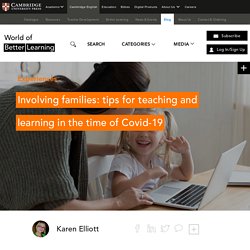
Research shows that the most important factor in a child’s educational success is the involvement of their parents or primary carers. In the first weeks of disruption caused by the pandemic, parents (especially of kindergarten and primary children) were essential to the coordinated effort of getting lessons up and running. Since then, they have become co-teachers and allies. How can teachers and school systems respond to the COVID-19 pandemic? Some lessons from TALIS - OECD Education and Skills Today. By Andreas Schleicher Director, OECD Directorate for Education and Skills As the world becomes increasingly interconnected, so do the risks we face.
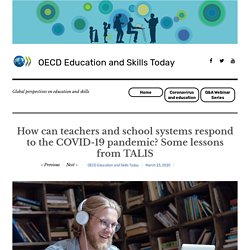
The COVID-19 pandemic doesn’t stop at national borders, and it affects people regardless of nationality, level of education, income or gender. But that may not be true for its consequences, which are likely to hit the most vulnerable hardest. Education is no exception. This crisis exposes the many inequities in our education systems – from the broadband and computers needed for online education, through to the supportive environments needed to focus on learning, up to our failure to attract talented teachers to the most challenging classrooms. Mexico’s COVID-19 distance education program compels a re-think of the country’s future of education. Saturday, March 14, 2020 was a historic day for education in Mexico.
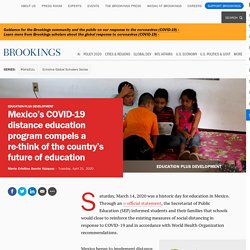
Through an official statement, the Secretariat of Public Education (SEP) informed students and their families that schools would close to reinforce the existing measures of social distancing in response to COVID-19 and in accordance with World Health Organization recommendations. Mexico began to implement distance education programs such as Aprende en Casa (Learn at Home), where primary and secondary school students can access educational content on television and the internet to continue their learning. However, due to the lack of internet connectivity in isolated parts of the country, the Aprende en Casa program is not accessible to all students, especially girls. Because of both physical distance to schools and gender norms that keep them at home, they are in the greatest need of distance education programs that can be enjoyed safely. Free internet access. MéxicoX. The Ministry of Education of México (SEP) through Television Educativa signed a cooperation agreement as a member with edX.

The Mexican Government made a covenant with its most prestigious educational institutions to offer the best massive online open courses. Televisión Educativa is part of the Secretaría de Educación Pública (Ministry of Education) of México. It was created with the aim of contributing to the strengthening and development of teaching, and offers new alternatives for audiovisual education aimed at resolving the educational gap, especially in rural areas, through the EDUSAT Network. The Challenges of Online Education in Public Schools in Mexico — Observatory of Educational Innovation. The first response to the contingency of COVID-19 was the school closures throughout Mexico from preschool to the university level.
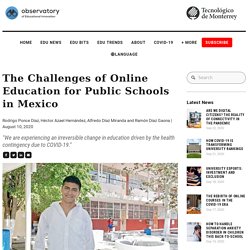
This measure helped control the number of contagions among the children and youth population; however, it jeopardized the completion of the 2019-2020 school year, mainly in the public schools. Due to the advance of the contagion, the federal government proposes to start the next school year 2020-2021 with distance education, using television stations to bring educational content to all the homes in Mexico. With this proposal, it would seem that the next school year's challenge is solved; however, distance education presents many challenges to reach all the school-age population of children and young people. Cofepris advierte sobre nueve marcas de gel antibacterial que contienen metanol. La Comisión Federal para la Protección contra Riesgos Sanitarios (Cofepris) emitió un alerta sanitaria tras detectar la presencia de metanol en al menos 9 marcas de gel antibacterial comercializados en nuestro país.
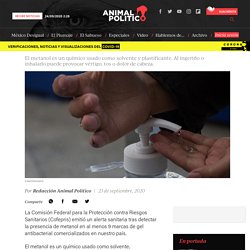
El metanol es un químico usado como solvente, combustible, plastificante y en la producción de pinturas, barnices, cementos, tintas, plásticos, colorantes, entre otros, por lo que ingerirlo es altamente peligroso. Chamarras – Página 2 – Corazón ContentoⓇ Chamarra de mezclilla, color Azul, Aves y Animalitos Blancos, Talla doble extra grande.
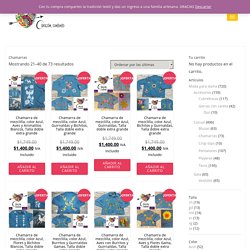
UNESCO’s support: Educational response to COVID-19. Remote Learning, EdTech & COVID-19. The information on this website was collected by the World Bank´s Edtech team during the initial response of education systems (“coping phase”) to school closings due to the COVID-19 pandemic.
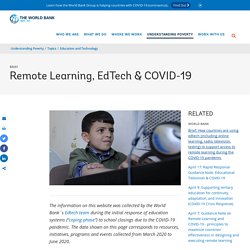
The data shown on this page corresponds to resources, initiatives, programs and events collected from March 2020 to June 2020. The resources on this page remain available but will not be updated. For more information about the phases of “managing continuity” and “improving and accelerating”, please visit the Lessons For Education during the COVID-19 crisis site. Large-scale, national efforts to utilize technology in support of remote learning, distance education and online learning during the COVID-19 pandemic are emerging and evolving quickly. This page attempts to curate useful resources and publish related documents collected and prepared by the World Bank's edtech team in support of national dialogues with policymakers around the world. From the World Bank document library: Educational radio. Gamificación: pedagogías emergentes para tiempos de confinamiento (VI) “¡El mundo se ha parado, una pandemia mundial nos ataca y debemos encontrar la solución!”.
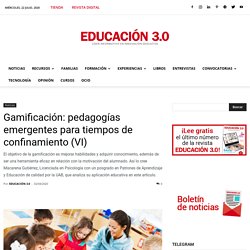
Hace unos meses atrás, esta podría haber sido una frase fantasiosa para iniciar una clase gamificada en las aulas de primaria. Y como la realidad siempre supera a la ficción, aquí estamos, con el mundo en pausa y buscando soluciones. Choice page. ?amp_js_v=a3&_gsa=1&outputType=amp-type&usqp=mq331AQFKAGwASA=#referrer= %1$s&share= Profesores al borde de un ataque de nervios - La Tercera. ?amp_js_v=a3&_gsa=1&usqp=mq331AQFKAGwASA=#referrer= %1$s&share= En cumplimiento a lo establecido en el Plan Nacional de Desarrollo 2019-2024, la Secretaría de Educación Pública (SEP) elaboró el Programa Sectorial de Educación (PSE) 2020-2024, con planteamientos incluyentes y una visión de largo plazo, para disminuir las brechas de atención o rezagos en comunidades y territorios del país.
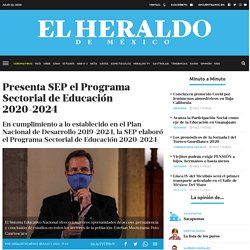
El programa incluye propuestas presentadas por 19 entidades federativas y de 29 áreas de la SEP, de órganos desconcentrados y paraestatales, además de observaciones y sugerencias de instituciones de otros ámbitos de gobierno, lo que revela la plena colaboración que hay en el tema educativo y que sólo tiene el objetivo de fortalecer la educación de las niñas, niños, adolescentes y jóvenes; el desarrollo del magisterio, y el fomento de una mayor participación de madres y padres de familia en el sector. La pedagogía del día después: ¿qué hacer con los 10 millones de alumnos que solo fueron dos semanas a la escuela? - Infobae.
Failure-in-the-virtual-classroom-11592776152?amp_js_v=a3&_gsa=1&usqp=mq331AQFKAGwASA=#referrer= %1$s&share= Pedagogías emergentes en tiempos de confinamiento. Digicel E Learning. Märt Aro is the Co-Founder at DreamApply, a world-class digital solution used by more than 200 satisfied education institutions worldwide. Märt believes that we have all the means and knowledge available to significantly increase the quality of learning experience and provide access to education to everybody globally. Hence he is constantly seeking opportunities to make this happen. Märt Aro’s involvement in the field of education development dates back to his secondary school years which saw Märt organising educational events for peers on a national level. Since 2004, Märt has established several organisations and companies in the area of education development.
The latest solution, DreamApply.com Student Application Management Platform, Märt co-founded in 2011. "Covid-19 aventó a los maestros al ruedo sin herramientas": profesores padecen clases en línea. Now Is Not the Time to Assess Online Learning. In a recent Chronicle Review essay, Jonathan Zimmerman called the coronavirus outbreak a natural experiment during which colleges can, at last, perform research about the effectiveness of online learning. He claimed that the jury is out about “whether the move to online learning is good or bad for students” because research to date is “marred by the problem of self-selection” and because colleges sell the convenience of online study while papering over how “people with less academic opportunity and skill were likely to suffer more from online instruction.”
Based on those assumptions, Zimmerman called for research to take advantage of this “set of unprecedented natural experiments” in which everyone is now “compelled to take all of their classes online.” But this call for research rests on assumptions that are at best contentious and at worst untrue. But these are not solvable problems. Actividades Montessori para bebés y niños. La médica italiana María Montessori ideó un método educativo caracterizado por poner énfasis en las actividades de los niños, pues el niño en sus primeros 3 años se encuentra en el periodo llamado ¨Mente absorbente¨. El objetivo de este método es liberar el potencial de cada niño mientras logra su propio desarrollo en un ambiente estructurado, mientras son observados y guiados por un maestro. Al aplicar algunas de las técnicas de este método en casa, los pequeños pueden aprender algunas habilidades motrices y cognitivas que pueden servirle mucho para su desarrollo.
Esta etapa es clave por la facilidad y rapidez de aprendizaje, siendo un periodo sensible para: The Difference Between Emergency Remote Teaching and Online Learning. Well-planned online learning experiences are meaningfully different from courses offered online in response to a crisis or disaster. Colleges and universities working to maintain instruction during the COVID-19 pandemic should understand those differences when evaluating this emergency remote teaching. Due to the threat of COVID-19, colleges and universities are facing decisions about how to continue teaching and learning while keeping their faculty, staff, and students safe from a public health emergency that is moving fast and not well understood.
Expertos de la Universidad de Granada calculan que meter a 20 niños en un aula supone 808 contactos cruzados en dos días. Every Student Podcast John Hattie. Mark Scott Hi, I'm Mark Scott, Secretary of the NSW Department of Education. Welcome to Every Student, the podcast where I get to introduce you to some of our great leaders in education. Today my special guest is John Hattie, Laureate Professor of the Melbourne Graduate School of Education, and Chair of the Australian Institute for Teaching and School Leadership.
John's work is internationally acclaimed and his influential book, Visible Learning, is believed to be the world's largest evidence-based study into the factors that improve student learning. He's just the person to put into context the effects of COVID-19 on student learning and to help us think through how we best return our students to the classroom and what the balance of the 2020 school year should look like. John Hattie It's great to be with you, Mark. John, at the beginning of the school year, we would have thought that bushfires would have been the major impact on teaching and learning in many of our schools. Pleasure. Instantly Shifting Classes Online Is Not Trivial. In response to the novel coronavirus, many South Korean universities have moved their teaching online.
Students are still provided with the required number of class hours but without face-to-face contact with teachers. The ministry of education in the UAE has announced that university teaching will move online. In Italy, the government has ordered the closure of all universities until March 15. Italian universities, too, are switching to online teaching, as are numerous institutions in the United states and United Kingdom This global shift to online learning follows the example set by universities in China, where the outbreak first began. Carefully implemented, online learning can make university education more accessible, affordable, interactive and student-centered. Instantly Shifting Classes Online Is Not Trivial.